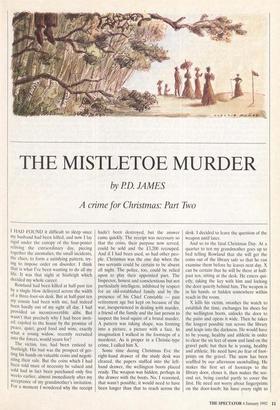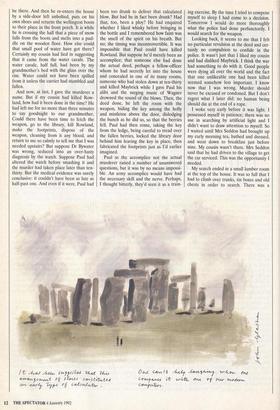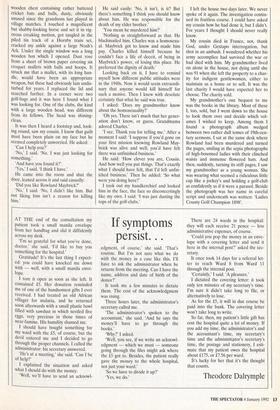THE MISTLETOE MURDER
by P.D. JAMES A crime for Christmas: Part Two
I HAD FOUND it difficult to sleep since my husband had been killed, and now I lay rigid under the canopy of the four-poster reliving the extraordinary day, piecing together the anomalies, the small incidents, the clues, to form a satisfying pattern, try- ing to impose order on disorder. I think that is what I've been wanting to do all my life. It was that night at Stutleigh which decided my whole career.
Rowland had been killed at half-past ten by a single blow delivered across the width of a three-foot-six desk. But at half-past ten my cousin had been with me, had indeed been hardly out of my sight all day. I had provided an incontrovertible alibi. But wasn't that precisely why I had been invit- ed, cajoled to the house by the promise of peace, quiet, good food and wine, exactly what a young widow, recently recruited into the forces, would yearn for? The victim, too, had been enticed to Stutleigh. His bait was the prospect of get- ting his hands on valuable coins and negoti- ating their sale. But the coins which I had been told must of necessity be valued and sold had in fact been purchased only five weeks earlier, almost immediately after my acceptance of my grandmother's invitation. For a moment I wondered why the receipt hadn't been destroyed, but the answer came quickly. The receipt was necessary so that the coins, their purpose now served, could be sold and the £3,200 recouped. And if I had been used, so had other peo- ple. Christmas was the one day when the two servants could be certain to he absent all night. The police, too, could he relied upon to play their appointed part. The Inspector, honest and conscientious but not particularly intelligent, inhibited by respect for an old-established family and by the presence of his Chief Constable — past retirement age but kept on because of the war, inexperienced in dealing with murder, a friend of the family and the last person to suspect the local squire of a brutal murder. A pattern was taking shape, was forming into a picture, a picture with a face. In imagination I walked in the footsteps of a murderer. As is proper in a Christie-type crime, I called him X.
Some time during Christmas Eve the right-hand drawer of the study desk was cleared, the papers stuffed into the left- hand drawer, the wellington boots placed ready. The weapon was hidden, perhaps in the drawer with the boots. No, I reasoned, that wasn't possible; it would need to have been longer than that to reach across the desk. I decided to leave the question of the weapon until later.
And so to the fatal Christmas Day. At a quarter to ten my grandmother goes up to bed telling Rowland that she will get the coins out of the library safe so that he can examine them before he leaves next day. X can he certain that he will be there at half- past ten, sitting at the desk. He enters qui- etly, taking the key with him and locking the door quietly behind him. The weapon is in his hands, or hidden somewhere within reach in the room.
X kills his victim, smashes the watch to establish the time, exchanges his shoes for the wellington boots, unlocks the door to the patio and opens it wide. Then he takes the longest possible run across the library and leaps into the darkness. He would have to be young, healthy and athletic in order to clear the six feet of snow and land on the gravel path; but then he is young, healthy and athletic. He need have ,no fear of foot- prints on the gravel. The snow has been scuffled by our afternoon snowballing. He makes the first set of footsteps to the library door, closes it, then makes the sec- ond set, being careful partly to cover the first. He need not worry about fingerprints on the door-knob; his have 'every right to be there. And then he re-enters the house by a side-door left unbolted, puts on his own shoes and returns the wellington boots to their place in the front porch. It is while he is crossing the hall that a piece of snow falls from the boots and melts into a pud- dle on the wooden floor. How else could that small pool of water have got there? Certainly my cousin had lied in suggesting that it came from the water carafe. The water carafe, half full, had been by my grandmother's bed with the glass over the rim. Water could not have been spilled from it unless the carrier had stumbled and fallen.
And now, at last, I gave the murderer a name. But if my cousin had killed Row- land, how had it been done in the time? He had left me for no more than three minutes to say goodnight to our grandmother. Could there have been time to fetch the weapon, go to the library, kill Rowland, make the footprints, dispose of the weapon, cleaning from it any blood, and return to me so calmly to tell me that I was needed upstairs? But suppose Dr Bywater was wrong, seduced into an over-hasty diagnosis by the watch. Suppose Paul had altered the watch before smashing it and the murder had taken place later than ten- thirty. But the medical evidence was surely conclusive: it couldn't have been as late as half-past one. And even if it were, Paul had been too drunk to deliver that calculated blow. But had he in fact been drunk? Had that, too, been a ploy? He had enquired whether I liked whisky before bringing in the bottle and I remembered how faint was the smell of the spirit on his breath. But no; the timing was incontrovertible. It was impossible that Paul could have killed Rowland. But suppose he'd merely been an accomplice; that someone else had done the actual deed, perhaps a fellow-officer whom he had secretly let into the house and concealed in one of its many rooms, someone who had stolen down at ten-thirty and killed Maybrick while I gave Paul his alibi and the surging music of Wagner drowned the sound of the blows. Then, the deed done, he left the room with the weapon, hiding the key among the holly and mistletoe above the door, dislodging the bunch as he did so, so that the berries fell. Paul had then come, taking the key from the ledge, being careful to tread over the fallen berries, locked the library door behind him leaving the key in place, then fabricated the footprints just as I'd earlier imagined.
Paul as the accomplice not the actual murderer raised a number of unanswered questions, but it was by no means impossi- ble. An army accomplice would have had the necessary skill and the nerve. Perhaps, I thought bitterly, they'd seen it as a train- ing exercise. By the time I tried to compose myself to sleep I had come to a decision. Tomorrow I would do more thoroughly what the police had done perfunctorily. I would search for the weapon.
Looking back, it seems to me that I felt no particular revulsion at the deed and cer- tainly no compulsion to confide in the police. It wasn't just that 1 liked my cousin and had disliked Maybrick. I think the war had something to do with it. Good people were dying all over the world and the fact that one unlikeable one had been killed seemed somehow less important. I know now that I was wrong. Murder should never be excused or condoned. But I don't regret what I later did: no human being should die at the end of a rope.
I woke very early before it was light. I possessed myself in patience; there was no use in searching by artificial light and I didn't want to draw attention to myself. So I waited until Mrs Seddon had brought up my early morning tea, bathed and dressed, and went down to breakfast just before nine. My cousin wasn't there. Mrs Seddon said that he had driven to the village to get the car serviced. This was the opportunity I needed.
My search ended in a small lumber room at the top of the house. It was so full that I had to climb over trunks, tin boxes and old chests in order to search. There was a wooden chest containing rather battered cricket bats and balls, dusty, obviously unused since the grandsons last played in village matches. I touched a magnificent but shabby-looking horse and set it in vig- orous creaking motion, got tangled in the piled tin track of a Hornby train set, cracked my ankle against a large Noah's Ark. Under the single window was a long wooden box which I opened. Dust rose from a sheet of brown paper covering six croquet mallets with balls and hoops. It struck me that a mallet, with its long han- dle, would have been an appropriate weapon, but these had obviously lain undis- turbed for years. I replaced the lid and searched further. In a corner were two golf-bags and it was here I found what I was looking for. One of the clubs, the kind with a large wooden head, was different from its fellows. The head was shining- clean.
It was then I heard a footstep and, look- ing round, saw my cousin. I know that guilt must have been plain on my face but he seemed completely unworried. He asked: `Can I help you?'
`No,' I said. 'No. I was just looking for something.'
`And have you found it?'
`Yes,' I said. 'I think I have.'
He came into the room and shut the door, leaned across it and said casually: `Did you like Rowland Maybrick?'
`No,' I said. `No, I didn't like him. But not liking him isn't a reason for killing him.' He said easily: 'No, it isn't, is it? But there's something I think you should know about him. He was responsible for the death of my elder brother.'
`You mean he murdered him?'
`Nothing as straightforward as that. He blackmailed him. Charles was a homosexu- al. Maybrick got to know and made him pay. Charles killed himself because he couldn't face a life of deceit, of being in Maybrick's power, of losing this place. He preferred the dignity of death.'
Looking back on it, I have to remind myself how different public attitudes were in the 1940s. Now it would seem extraordi- nary that anyone would kill himself for such a motive. Then I knew with desolate certainty that what he said was true.
I asked: 'Does my grandmother know about the homosexuality?'
`Oh yes. There isn't much that her gener- ation don't know, or guess. Grandmama adored Charles.'
`I see. Thank you for telling me.' After a moment I said: 'I suppose if you'd gone on your first mission knowing Rowland May- brick was alive and well, you'd have felt there was unfinished business.'
He said: 'How clever you are, Cousin. And how well you put things. That's exactly what I should have felt, that I'd left unfin- ished business.' Then he added: `So what were you doing here?'
I took out my handkerchief and looked him in the face, the face so disconcertingly like my own. I said: 'I was just dusting the tops of the golf-clubs.' I left the house two days later. We never spoke of it again. The investigation contin- ued its fruitless course. I could have asked my cousin how he had done it, but I didn't. For years I thought I should never really know.
My cousin died in France, not, thank God, under Gestapo interrogation, but shot in an ambush. I wondered whether his army accomplice had survived the war or had died with him. My grandmother lived on alone in the house, not dying until she was 91 when she left the property to a char- ity for indigent gentlewomen, either to maintain as a home or to sell. It was the last charity I would have expected her to choose. The charity sold.
My grandmother's one bequest to me was the books in the library. Most of these I, too, sold, but I went down to the house to look them over and decide which vol- umes I wished to keep. Among them I found a photograph album wedged between two rather dull tomes of 19th-cen- tury sermons. I sat at the same desk where Rowland had been murdered and turned the pages, smiling at the sepia photographs of high-bosomed ladies with their clinched waists and immense flowered hats. And then, suddenly, turning its stiff pages, I saw my grandmother as a young woman. She was wearing what seemed a ridiculous little cap like a jockey's and holding a golf-club as confidently as if it were a parasol. Beside the photograph was her name in careful script and underneath was written: 'Ladies County Golf Champion 1898'.












































 Previous page
Previous page